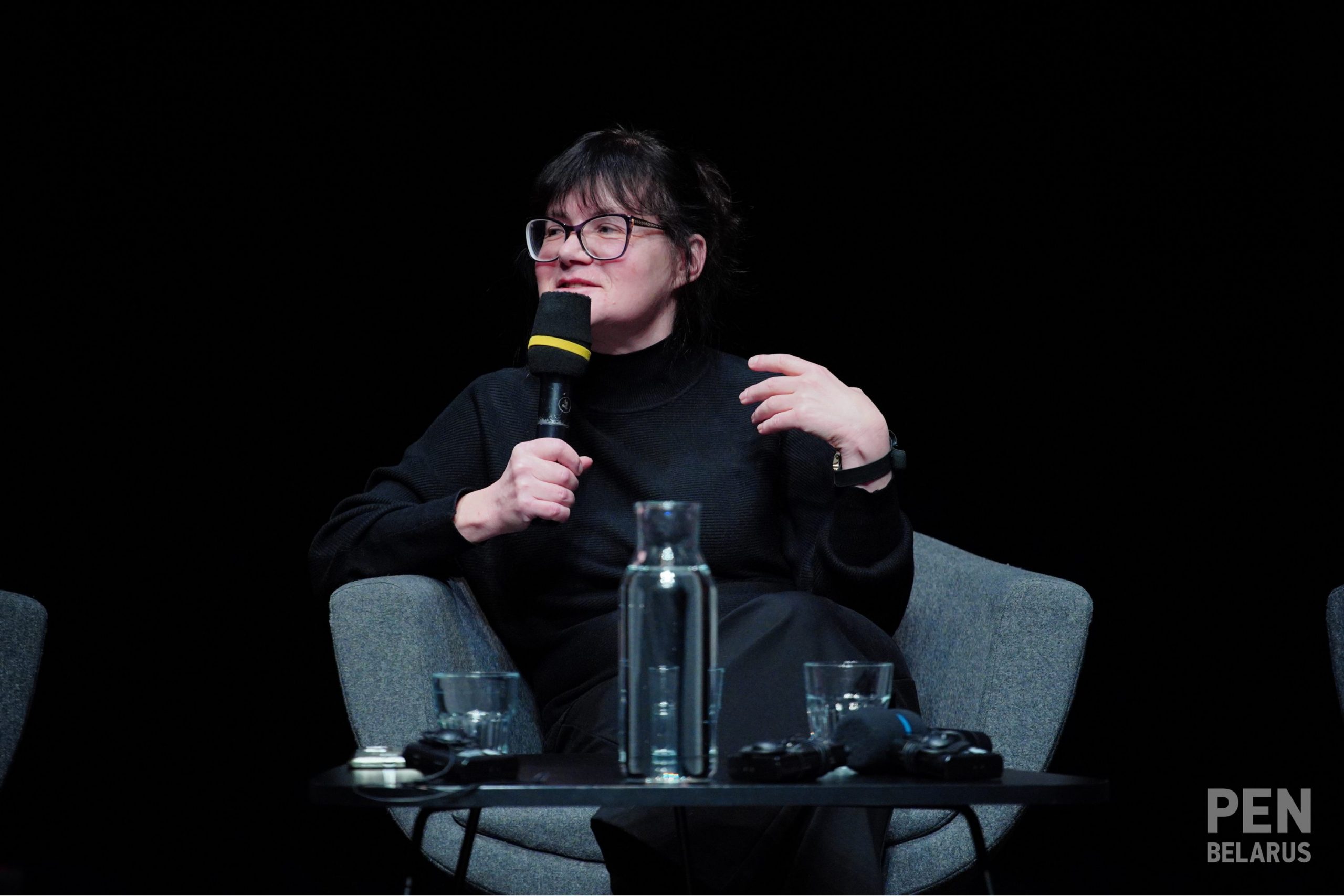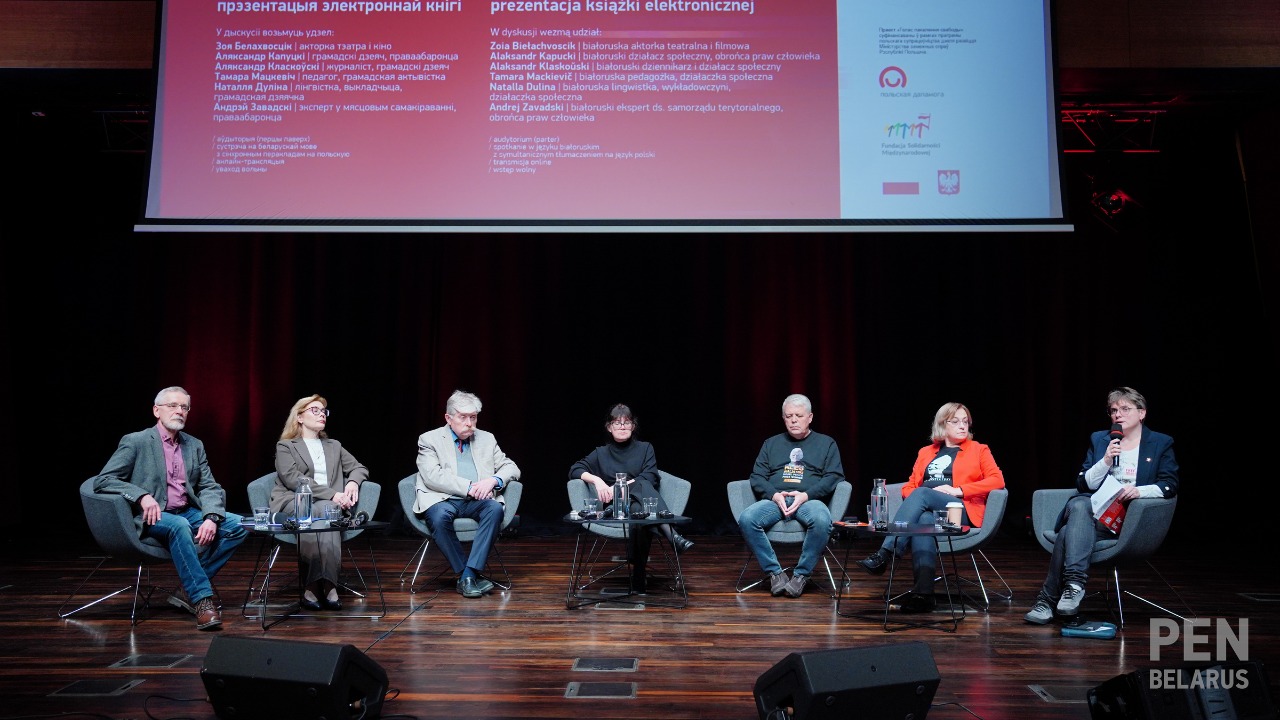
This year, PEN Belarus, Viasna, BAJ, Press Club Belarus, and Free Press for Eastern Europe established the Voice of the Freedom Generation award. People aged 60+ have been both witnesses to and participants in the transformations of recent decades — the builders of Belarusian civil society. The result of the award is a book of the same title, featuring 18 conversations with its first laureates. At the European Solidarity Centre in Gdańsk, an online edition of the collection was presented: six of its heroes and heroines spoke about their time and their lives. The discussion was moderated by Aliaksandr Klaskouski.
You can watch the recording of the livestream on our YouTube channel (in Belarusian).
“Belarusianness as a natural path”
Aliaksandr Klaskouski: Like many people of my generation, I was raised in a Soviet school with the standard set of “ideals.” I tried to escape the Komsomol, but they told me: without it, there would be no university. So I joined in my final year.
Then came perestroika — that is what truly turned our consciousness upside down. The thick journals, the articles about executed poets, about repression — your whole worldview was being flipped. That was also when I learned about my own great-grandfather: he too had been taken in the 1930s, only for his words and his voice.
At Znamya Yunosti during the perestroika era, we suddenly felt we could speak about things that had previously been forbidden. This newly opened truth had a powerful impact on public opinion. The newspaper had a circulation of nearly 800,000. And when we wrote about democratic candidates running for the Supreme Soviet of the 12th convocation, they usually won their seats.
Enough about me — let’s listen to the voices of our generation.

Andrej Zavadski: My path toward Belarusianness began with my family. Six of our relatives were repressed at different times. No wonder Radio Svaboda and the Voice of America were practically never turned off in our home.
Some may not believe it today, but I remember being fourteen, thinking about the Soviet Union, and suddenly realizing: this system has no future. It felt strange to sense something so clearly while millions around me didn’t see what was obvious to a child.
When I later joined one of the first late-Soviet informal communities, Majstrounia (with Khadyka, Viachorka, Sys, Ivashkevich), it felt like a natural continuation. Then came Talaka, and work in the Minsk City Council, where I was involved, among other things, in renaming streets and restoring the historical names of the capital’s streets and squares. It was our movement for dignity and memory — to give people a history they could be proud of. I connected that history with everyday life through the theory and practice of self-governance.
Aliaksandr Kapucki: As for me, I had the chance to be active in the Maladzechna city executive committee starting in late 1991. The head at the time was the unforgettable Hennadz Karpenka. I worked on sessions, documents, and served as secretary of the renaming commission.
In 1992, we began restoring the city’s old names for its main streets and squares. We were successful, even though part of the commission consisted of Soviet-era nomenklatura. But we managed to overcome their ideological resistance.
The funniest story was this: Lenin Avenue became Vialiki Hastinets — the old road to Vilnius. But many veterans, retired officers who had moved to the city, didn’t understand the word hastinets. They started translating it… as “Bolshoi podarok” — the Big Gift. They were outraged: “What kind of street name is this?!”
“We were ready. But not trained”
– Why didn’t Belarus in the 1990s follow the path of Poland or the Baltic states?
Tamara Mackievič: We had a very strong intellectual foundation. The youth of the late 1980s embraced the ideas of national revival and democracy with dignity and authenticity. In a certain sense, we were even more prepared for change than some of our neighbours.
But we lacked the essential thing — experience. Skills. We had not gone through our own school of democracy. And, of course, there was external pressure that significantly slowed our development.
In the early 1990s, the intelligentsia really did have its head in the clouds. Journalists were suddenly recognised as the fourth estate. The Popular Front gathered massive rallies. There were extraordinary opportunities for freedom of speech — and a sense of euphoria.
But ordinary people — those in the provinces, workers — were exhausted by poverty. And populists used this. Those who promised to “bring back the past” manipulated people: “you can’t spread democracy on your bread,” and then, unexpectedly for many, they surged ahead. So I sometimes wonder: maybe we were too busy with orthography reforms and symbols back then, forgetting about people’s everyday needs?
Andrej Zavadski: There is truth in that — but only a small part of it. Social and economic issues are important, of course. But you cannot build a future without national memory, cultural foundations, and your own identity. If a person doesn’t understand who they are and where they come from, no reforms will hold.
And another point: I disagree that we “had no democratic traditions.” We did. And very deep ones: Magdeburg rights, city self-governance, early forms of communal responsibility. Democracy begins where people are accustomed to making decisions about their own lives.
As John Paul II urged — “Do not be afraid!” That is the essence of self-governance and civil society: the courage to take responsibility. The state is only one wing. The other is local governance and community. Without it, society limps.

Tamara Mackievič: Allow me to respond. I did not say that we lack democratic traditions. Quite the opposite — democracy is our natural, deeply rooted value. What I meant was the lack of experience. Between medieval self-governance and the 20th century lie two hundred years of Russian imperial policy, followed by the Soviet period and a new wave of Russification. A long historical era during which people were deliberately taught not to think independently.
We must remember this when we reflect on why, in the 1990s, we had the will for change but not the necessary skills.
“Until we squeeze the Sovietness out of ourselves, there will be no change”
Zoja Belachvoscik: Soviet consciousness is deeply rooted; it operates even today — let alone yesterday. And language plays a huge role in overcoming it. It must be not just Belarusian, but native — like it was for my father, who thought in it.
We live in an unending loop of Russification. Jakub Kolas wrote about this more than a hundred years ago. But language is alive. It survived in impossible circumstances: when it had to be hidden, when printing in it was forbidden, when people were punished for using it.
This means we are resilient. We simply need time and consistency.
Aliaksandr Kapucki: There is another point to understand: in the pivotal 1990s, Belarus was mentally divided. The East had lived under the Soviet regime for 70 years. The West — much less, with different experiences and different historical memory.
This was visible even in the first presidential elections. In our region — administratively in the Hrodna region but culturally much closer to Vilnius — Lukashenka didn’t even win the first round. Pazniak came first.
But in Homiel and Mahiliou regions — entirely different picture. And how did it all end? During the 2016 campaign, I was an observer. A woman from Homiel region worked with me. She once admitted: “In 1994, at the end of the day, we in the commission signed ballots for Lukashenka ourselves. Our foolishness had no limits…” And they were not the only ones who did this.
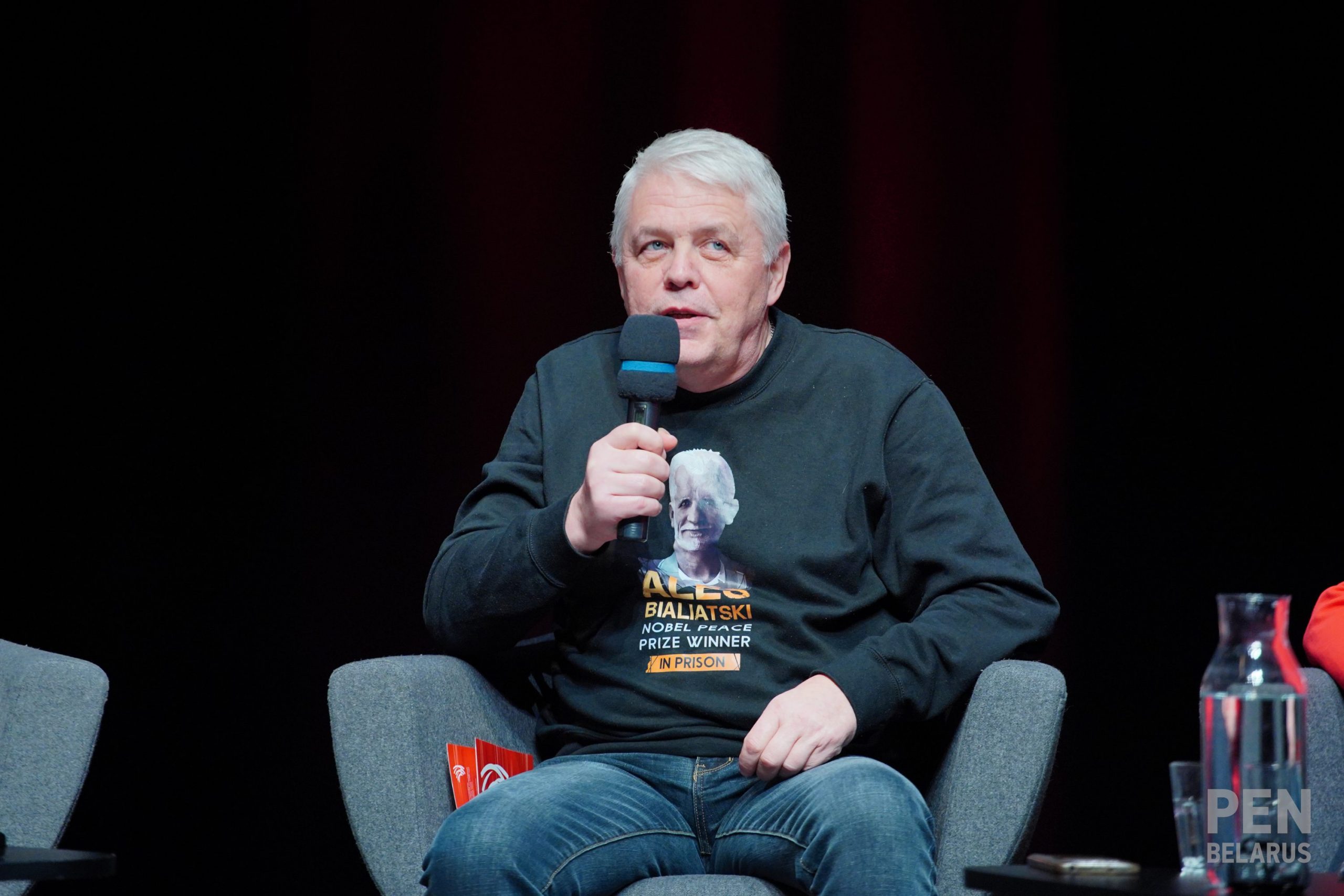
Natallia Dulina: I don’t represent the intelligentsia or any well-known communities. I’m an ordinary person. And for me, the word “voice” is about stopping being silent. The Soviet system was built on total deceit: you thought one thing and said another. One thing in the kitchen, another in public. And always the fear that even a joke could get you in trouble.
We still have a very long braking distance: the “Belarusian-partisan” lives on in many today. “We won’t say it, but we’ll do it.” This harms us. Because without open speech, there is no community.
“Freedom isn’t in numbers. It’s in not betraying yourself.”
– By the way, sociologist Filip Bikanau recently said that the most loyal group to the authorities today is those who were teenagers in 2020. Not the ones who took to the streets. Many young people now live in their own bubbles. The Internet doesn’t guarantee truth: people search for what feels comfortable. No wonder there are many voices doubting whether it was worth pouring out all that revolutionary energy…”
Zoja Belachvoscik: Indeed, we hear this question often. There is a myth, for example, that the Kupala Theatre actors were “pushed” by Latushka. That’s absurd. We’re not children, and we do have brains.
I’m proud of my colleagues. Not only the actors — the entire theatre, including stagehands, artists, even the cleaners, stood together.
Why? Because that summer we were preparing to celebrate a huge anniversary: the theatre’s centenary. We clearly understood that “you-know-who” would most likely come to the hall, and next to him “you-know-who-else.” But how can you celebrate when the country is covered in blood? So we said: no festivities, we cannot pretend nothing is happening.
On 13 August we gathered for a general meeting. The director and the chief director said quite honestly: “You know what will happen to us if we speak out, if we raise our voices?”
And that was precisely about our collective refusal to tolerate evil. We replied: “We know. But if you touch even one cleaner — we will all leave.” We had agreed on this internally beforehand.
Because it was the right thing to do.
And it wasn’t some theatrical gesture for a pretty story. It was about survival — the survival of dignity. We had already hung white-red-white flags in the theatre, they were torn down, we hung them again. And we understood: if the pressure begins, they will crush us one by one. That’s why we chose to stand together.
On 17 August, the first to be fired was Pavel Latushka. And as we had promised, we supported him by leaving as a group. It was an act of solidarity in which everyone understood the risks. But we also saw the alternative clearly: staying meant becoming servants of the regime. We knew exactly what awaited us — interviews about the “wise president,” how he “knows how to talk to the people,” and how we must all “serve him.” No one wanted that.
The Kupala Theatre has always been the voice of the nation. We stood on stage and spoke the words of Kupala, Adamovich, Bykau. And the idea that, at a moment when people are being beaten on the streets, we would pretend nothing terrible was happening — that was impossible.
I thought maybe only a few would refuse to stay. It turned out to be the entire troupe. And what’s especially important: the young actors were the first to step forward. It wasn’t us leading them — they were pulling us. So young people are actually very different…
Some members of the troupe are here now, in emigration; most are still in Belarus, and life is very hard for them. But I don’t know a single person from the Kupala Theatre who regrets that choice.
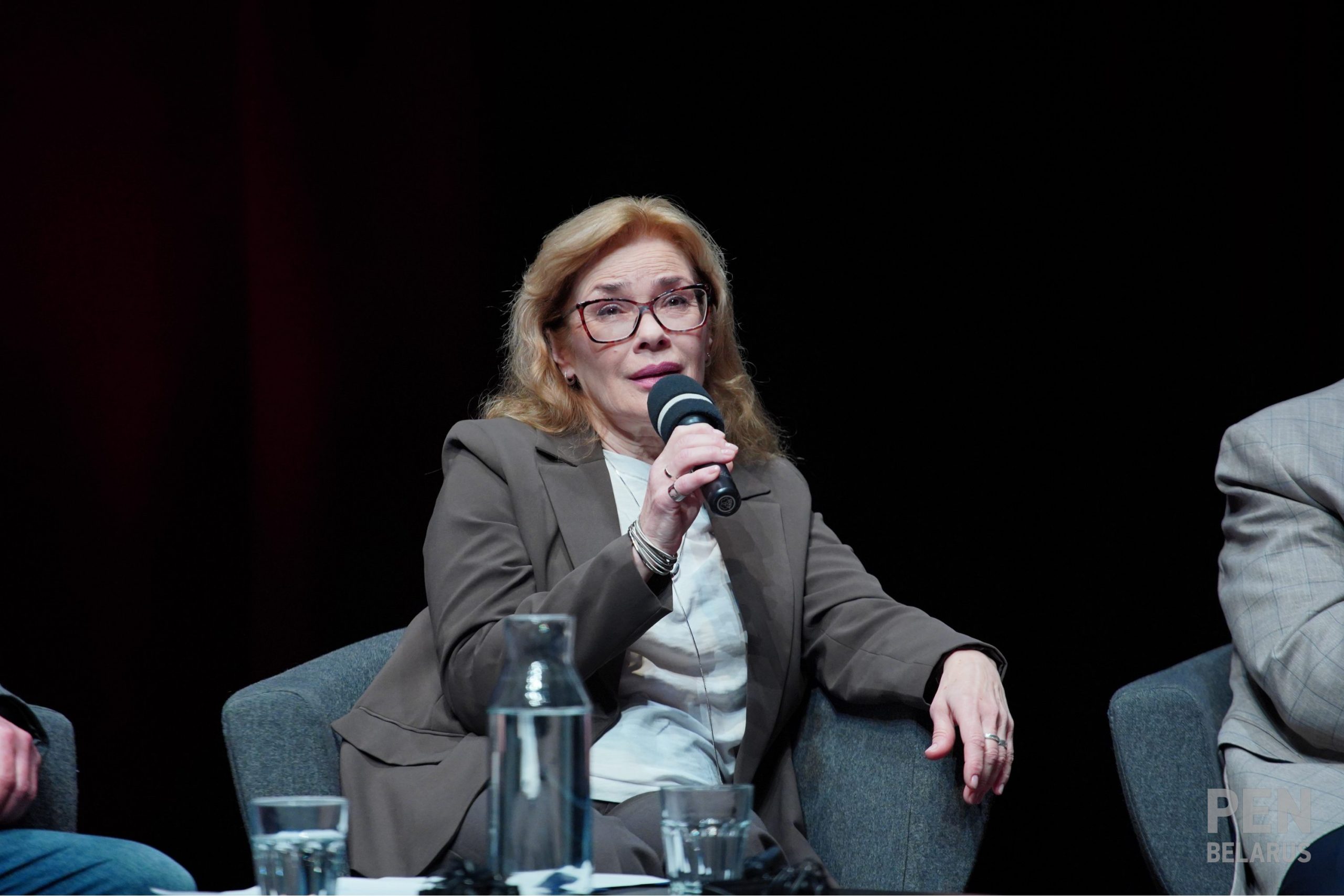
“New Belarus and the school of the future”
– Not everyone “there” is the same. Some try, in whatever small ways they can, to ease the lives of prisoners. But there are others — those who take pleasure in someone else’s pain. Where do such people come from? School? Upbringing? The system?
Tamara Mackievič: They are the product of a system in which the value-based component of education is absent.
When we say “school,” we usually mean only knowledge and skills: knowing the law, being able to apply it. Many of those who now work in the security structures were educated precisely this way: rules, instructions, “how to fill out the paperwork correctly.” But values — respect for human beings, dignity, empathy — often remain outside the brackets.
Modern education (not only in Europe) speaks about three components: knowledge, skills, and values.
The Belarusian system focused on the first two. And now we see the result.
I really like the phrasing used by a Slovak colleague, a former deputy minister of education: “A school should teach not only to know that a spider has eight legs, but also to understand that you must not tear them off.” In our schools, they often teach only the first part.
We, Belarusian educators, have already developed the model of a competence-based learner, soft skills, value orientations… But until these things are embedded in the norm — in laws, in the education code — the system will continue producing people for whom a “properly completed report” is more important than a human life.
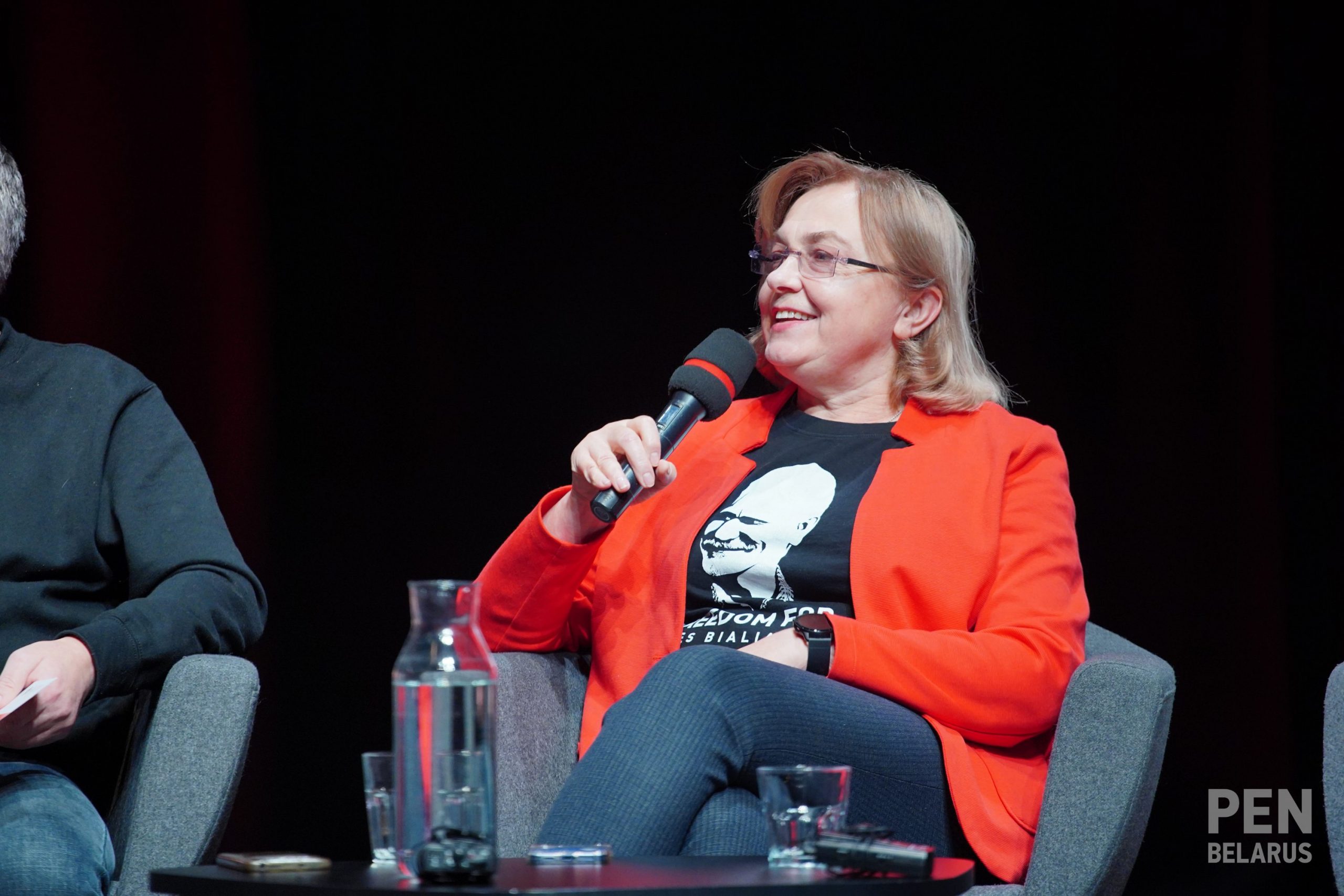
“If we imagine a new Belarus — whether through a sudden breakthrough or a long transition — what kind of educational model should we adopt? Poland’s? Or other countries’?”
Tamara Mackievič: I’m a great admirer of the Polish school system (the secondary level, not universities). The Poles based their reforms on the ideas of Lev Vygotsky — the very same figure presented to us as a “Soviet psychologist,” when in fact his concepts became the foundation of modern Western pedagogy.
Vygotsky was born in Orsha, worked in Homiel, and developed his schools and seminars there. Today, many European teaching methods grow directly out of his ideas: development through cooperation, the zone of proximal development, the understanding that a child is not a passive object but an active subject…
When people argue, “Western approaches don’t suit us, our mentality is different,” I always explain: this isn’t “foreign” — it is essentially ours, Belarusian. But refined and returned to us through the West. So we do have our own intellectual foundation; we simply ignored it for many years.
“If we’re talking about raising our Belarusian identity and citizenship again, it’s worth recalling Ms. Zoja’s wonderful monodrama…”
Zoja Belachvoscik: It’s not just a personal confession. It tells the stories of five generations of one family — a cross-section of our difficult Belarusian history.
What interests me is not my biography, but how the fate of specific, close people reflects what was happening to the country: repression, dekulakisation, war, Sovietisation, Russification… For example, Anton Vasilevich Baletski, from our family line — People’s Commissar of Education of the BSSR in 1926–1930. He worked on language and literature, he was a bright, remarkable personality. He was executed in Kurapaty in 1937 along with his colleagues. For me, that’s not just an encyclopaedia entry — it’s part of family memory.
But I didn’t deliver a “solemn history lecture.” There is humour, songs, simple human conversation. And we need many more stories like this. Belarusians should know not only the names of executioners, but also their great teachers, writers, scholars — those who built the country.
“The national idea: returning to our roots”
– Lukashenka has repeatedly gathered ‘ideologists’, demanding they invent a national idea supposedly capable of uniting Belarus — around him, of course. Nothing that ‘speaks to the soul’ has ever been produced. Instead, they built a brainwashing machine where ‘patriotism = serving the system’. Let’s try briefly: what is the national idea of Belarus for you?
Aliaksandr Kapucki: For me, it’s a return to the Latin (European) civilisation that Belarus belonged to until the late 18th century. Not only religiously, but broadly: Roman law, the free university tradition, local self-government, Magdeburg rights. We were part of this tradition, and then we were torn out of it and forced to live in another — imperial, Muscovite, “horde-like.”
Zoja Belachvoscik: I’ve always felt that a national idea cannot be invented artificially — it crystallises gradually within the nation itself. At a certain moment, what people truly need rises to the surface. Once, during a major tour in Tallinn, we felt especially clearly the three things that hold a nation together: literature, music, and faith. And theatre too — because it is also words, meaning. Can such an idea be written in a government office and imposed? I doubt it.
Andrej Zavadski: If the answer to the national idea were simple, we’d all be Nobel laureates. Ideology doesn’t unite — it divides, because no two people think exactly alike. What unites are values, traditions, culture. Everyone must feel personal responsibility for Belarus being independent, equal, free. Without an inner sense of freedom, nothing will work — a slave cannot be a patriot. This work takes decades.
Natallia Dulina: I don’t like the concept of a “national idea” at all. We will become Belarusians not when we invent one, but when we stop searching for it. Others will see us as a nation through our culture, our behaviour, our distinctiveness. More broadly, what matters most is humanity. Human values — from family to education — are the foundation. All the other elements grow from that: language in schools, history, culture, art.
Tamara Mackievič: I also dislike the hunt for a national idea. Put simply, it is whatever we are most lacking right now. People say we “lost” in 2020. We lost nothing! We completed the building of our nation. We saw it clearly: women, men, Belarusian-speakers, Russian-speakers, older, younger — all together. That is the nation. And to be fully happy, we now lack just one thing: our own democratically elected government.
The end.


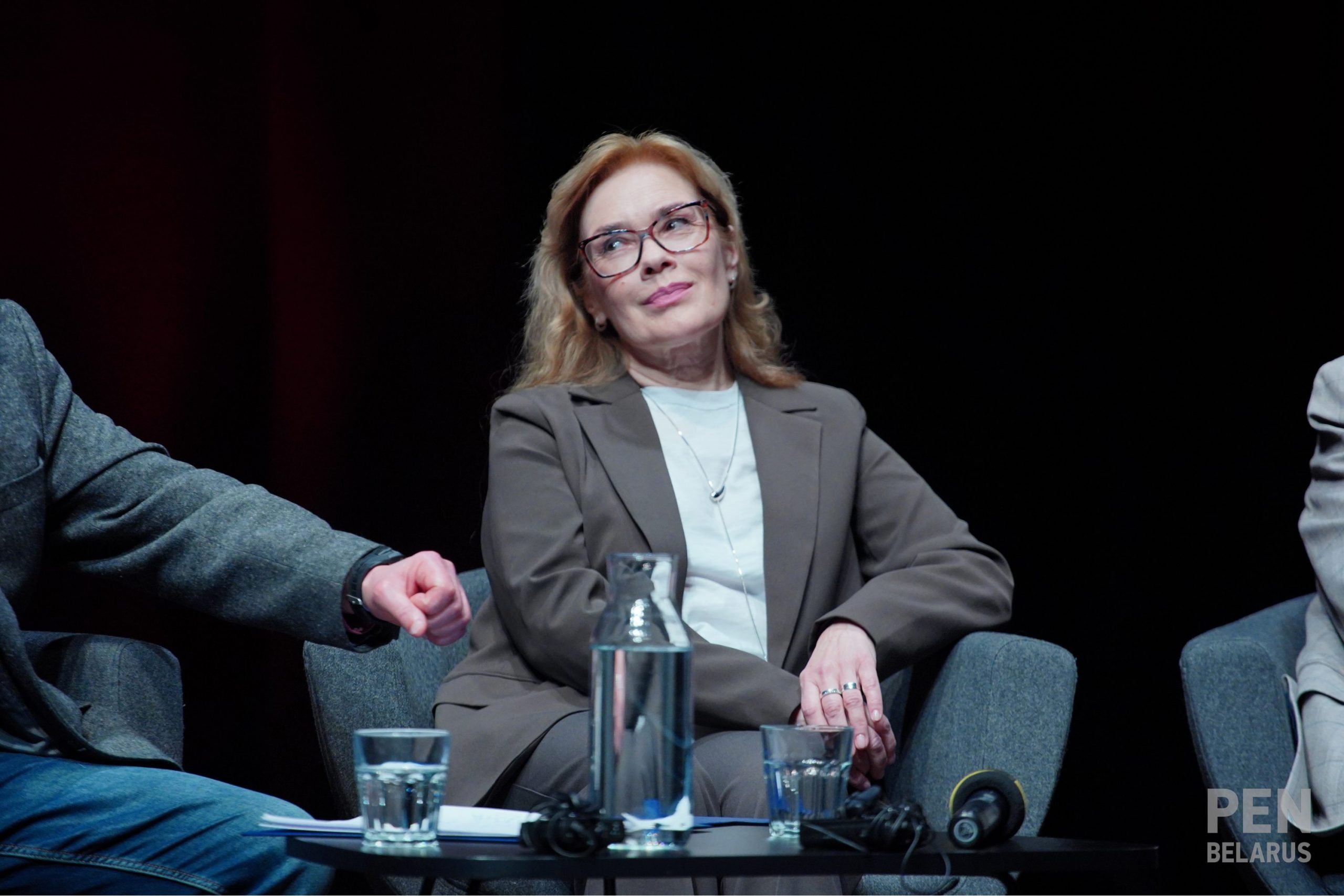
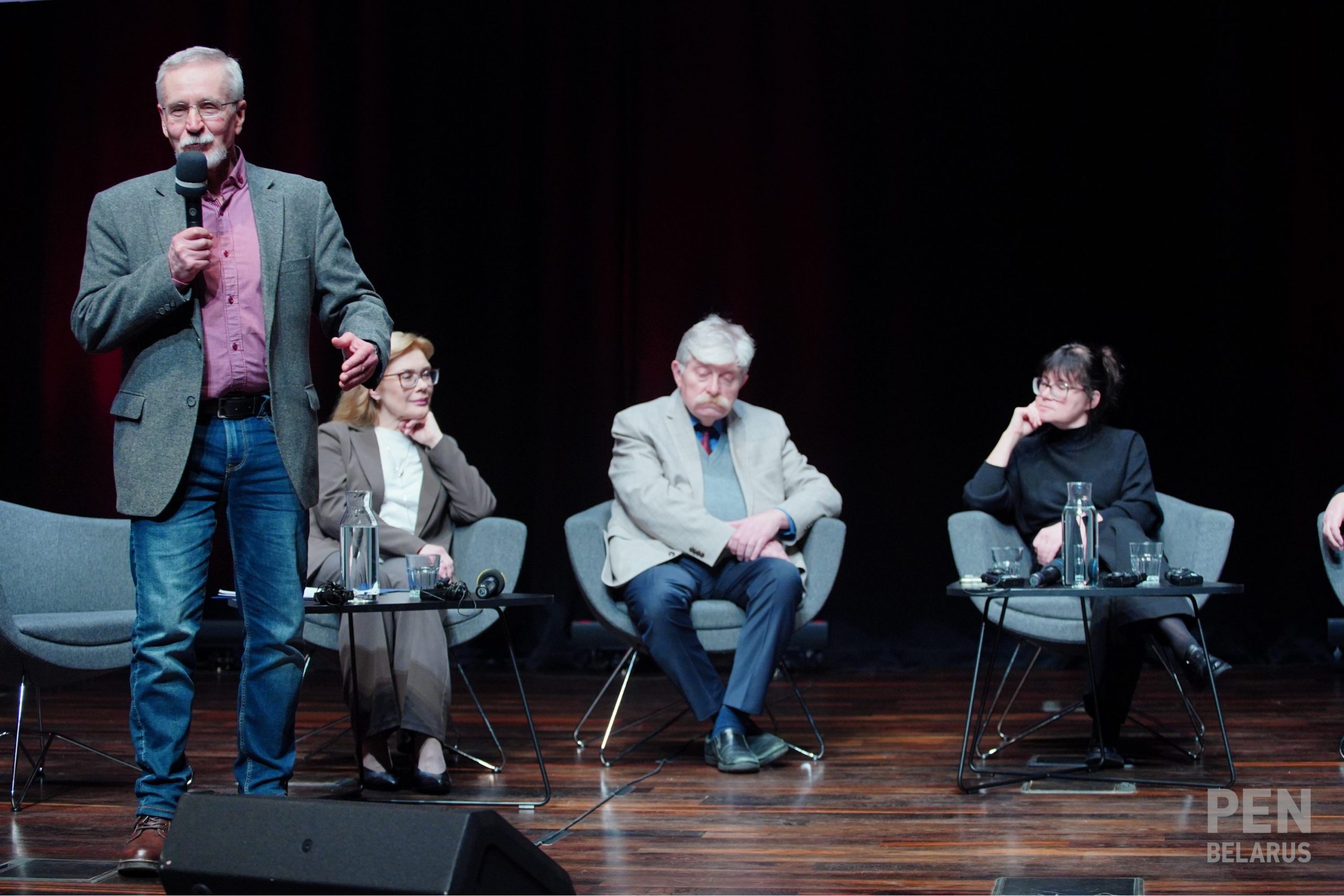
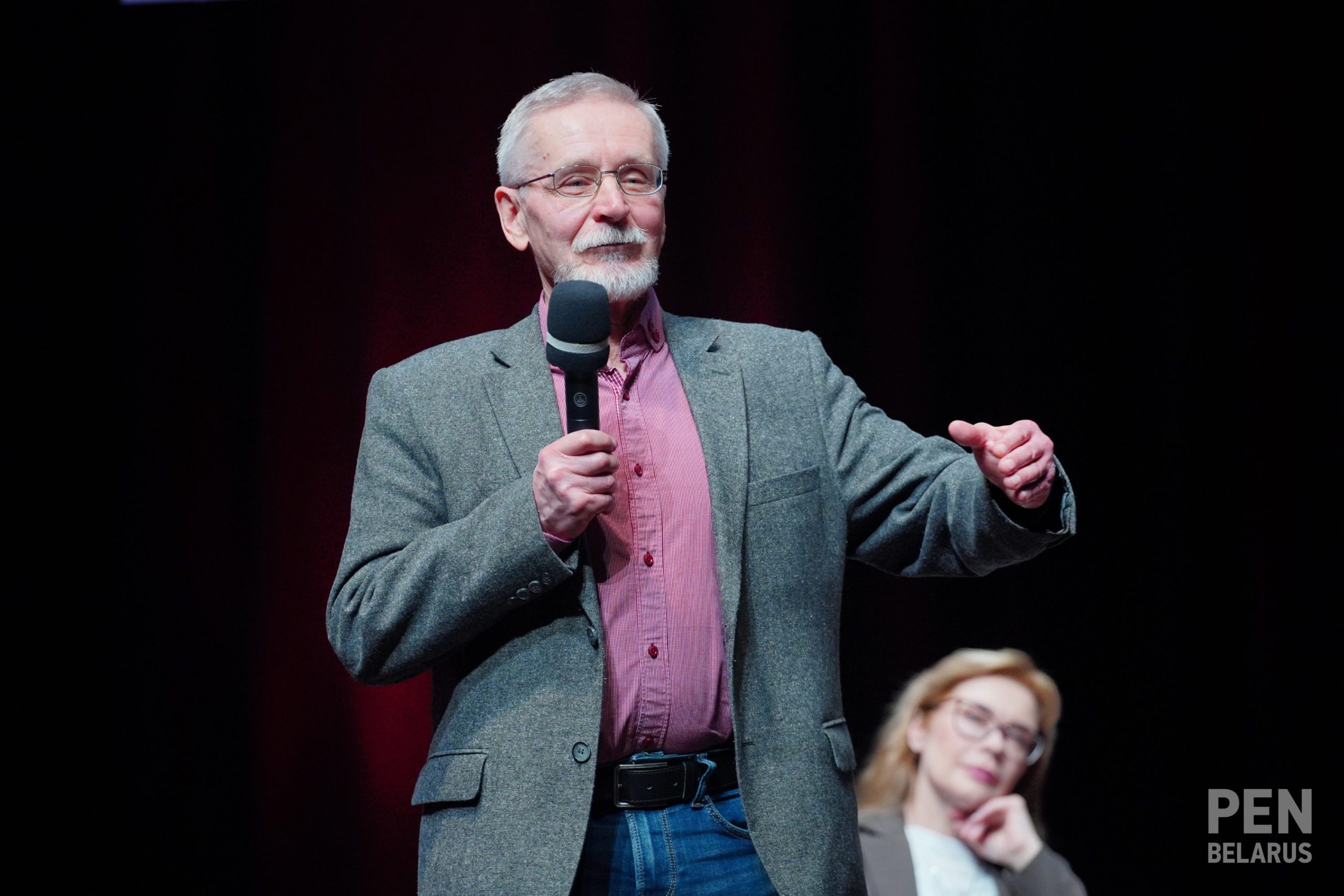
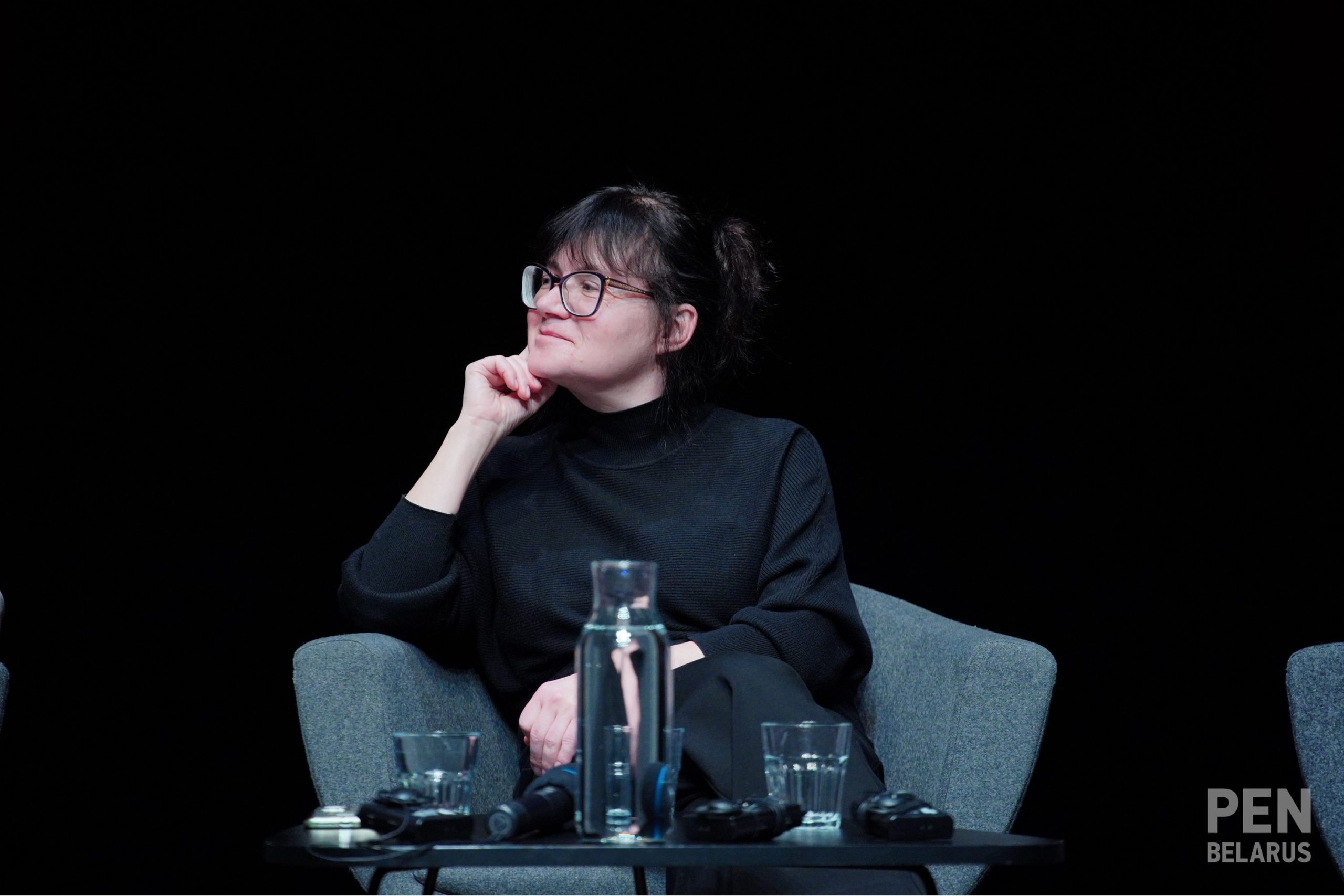
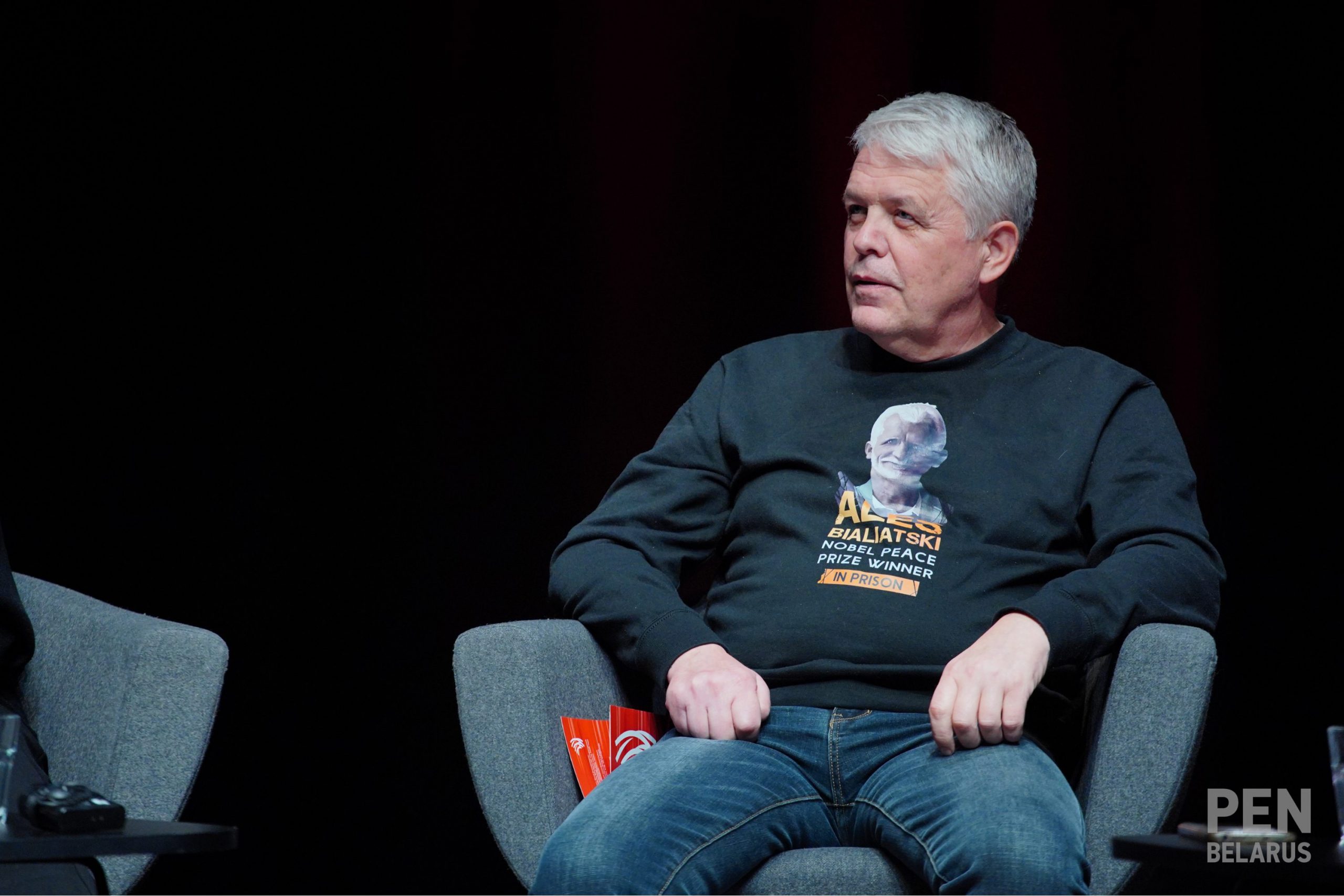


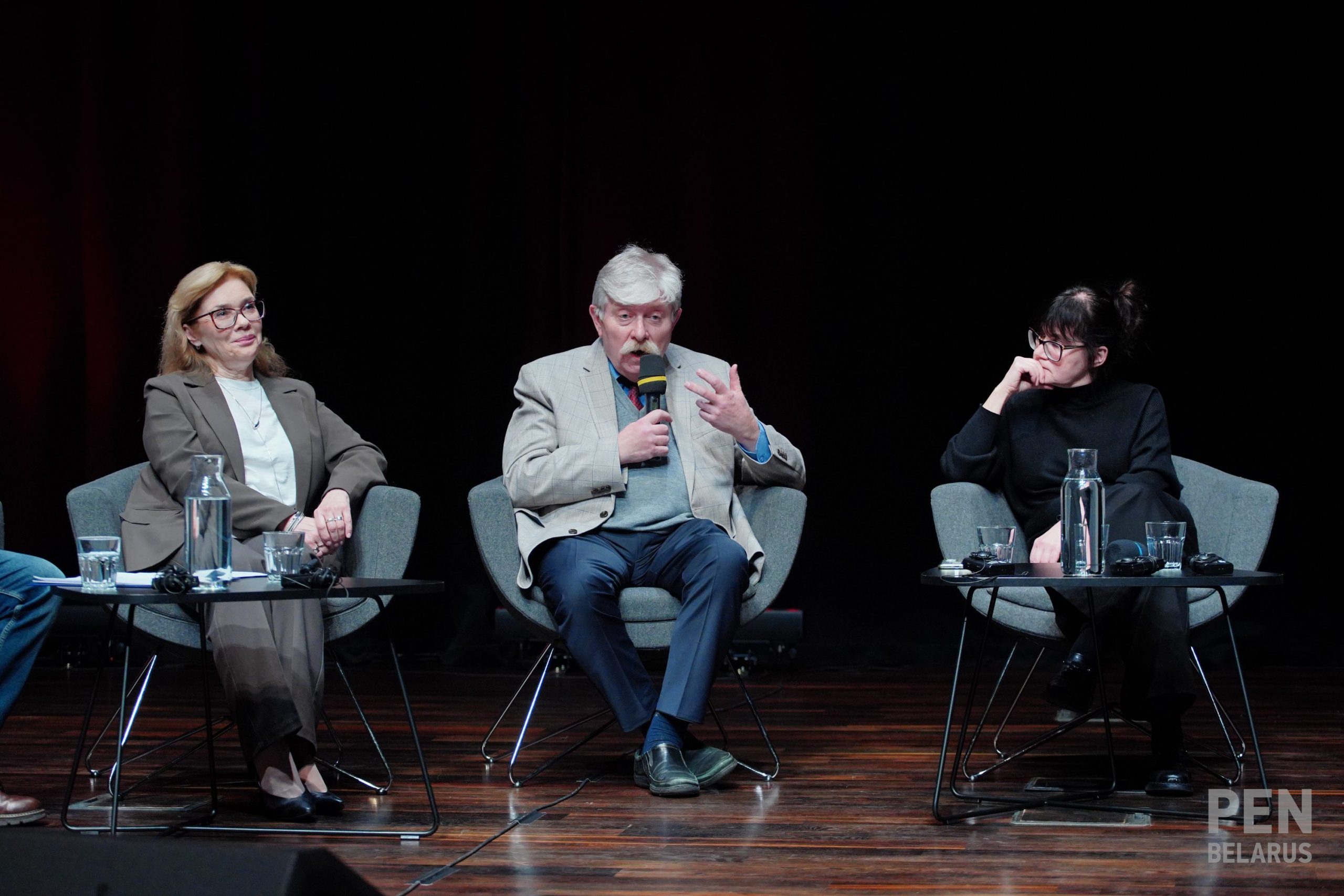
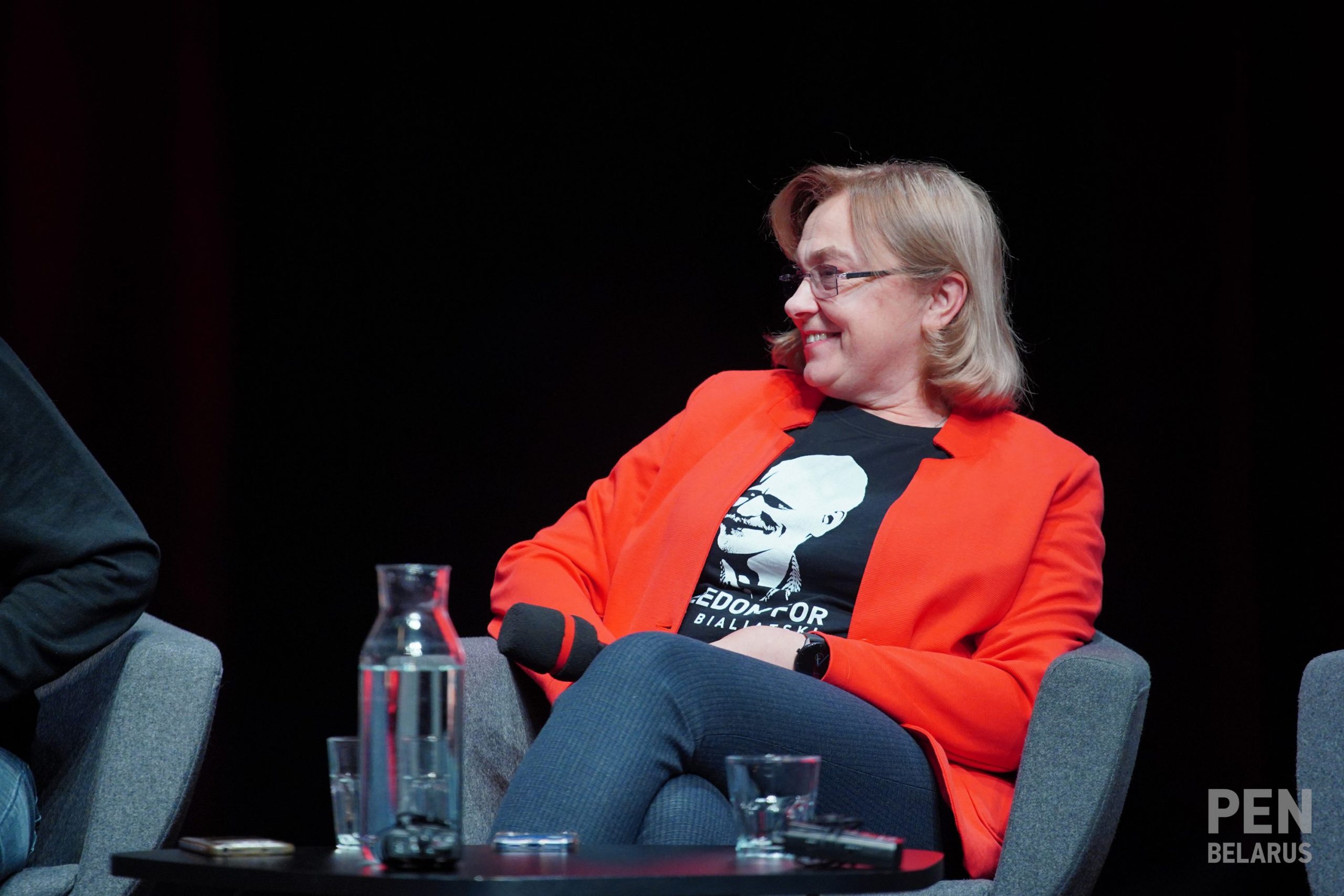
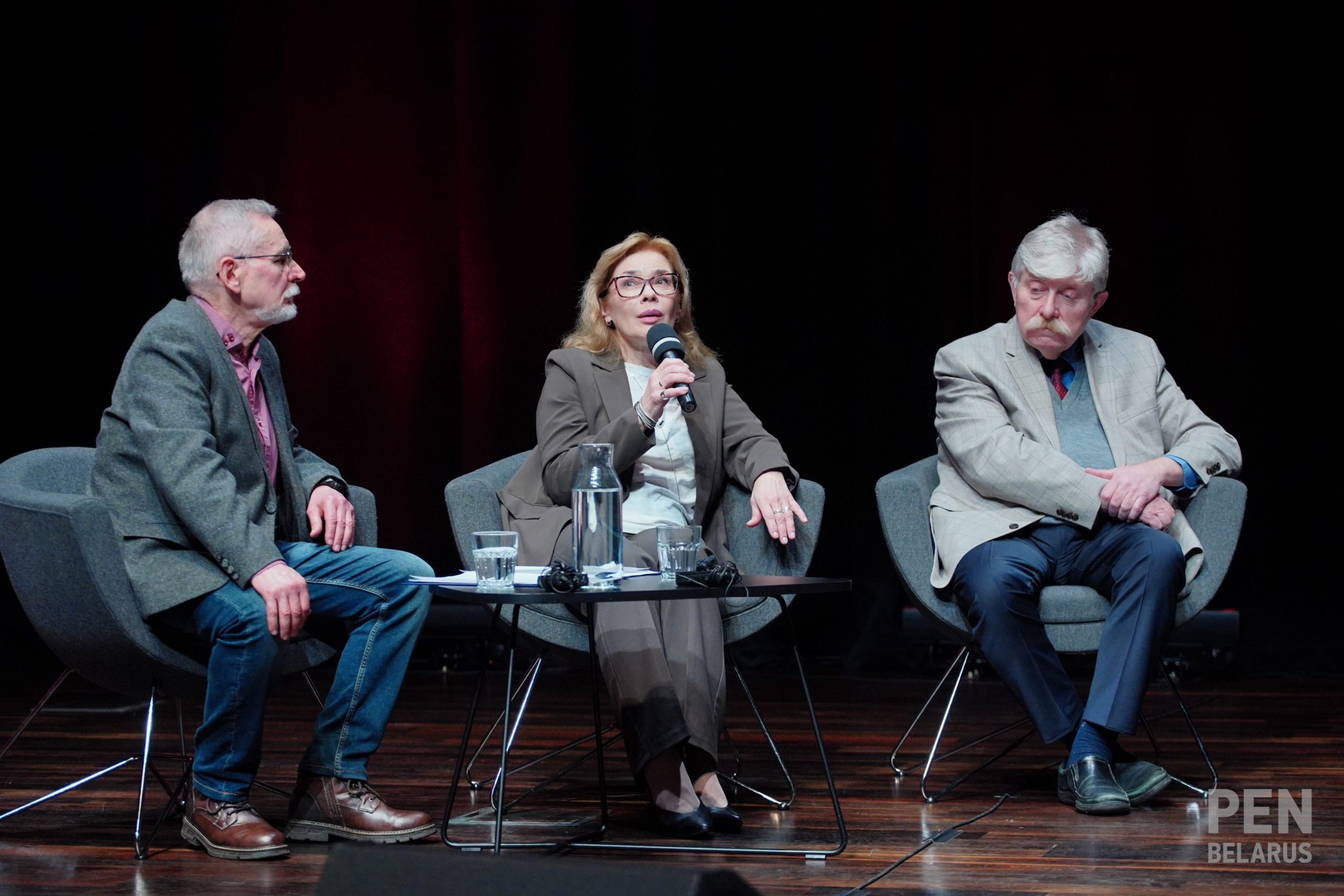
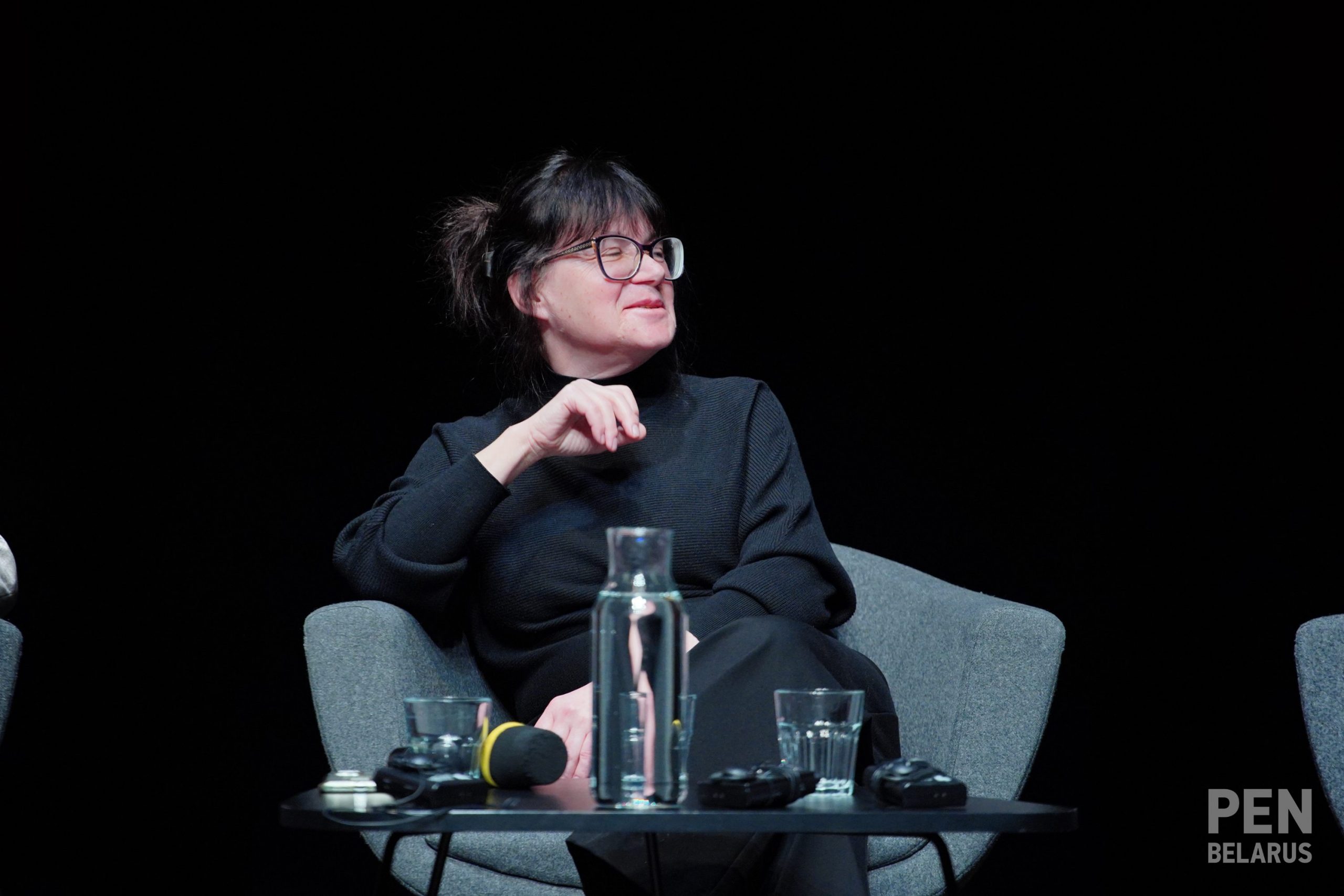


Photo: PEN Belarus

